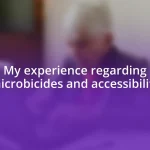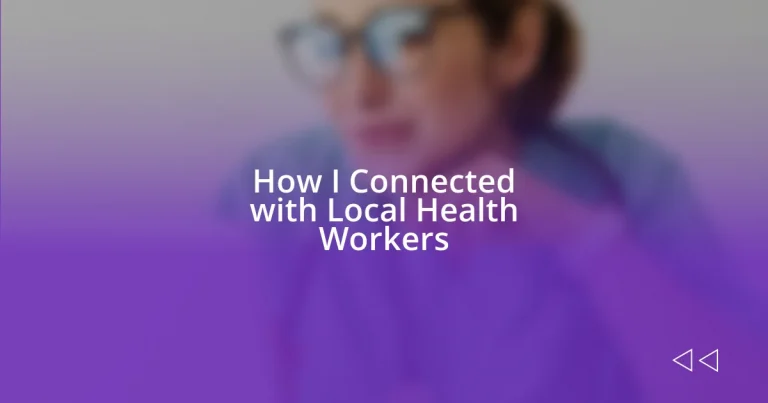Key takeaways:
- Identifying local health workers can be effectively achieved through community events, word of mouth, and social media platforms, enhancing access to care.
- Building trust through personal storytelling, consistent communication, and transparency strengthens relationships with health workers, facilitating better health management.
- Collaborating on community health initiatives fosters a sense of belonging and empowers individuals to advocate for improved health resources and awareness in their communities.
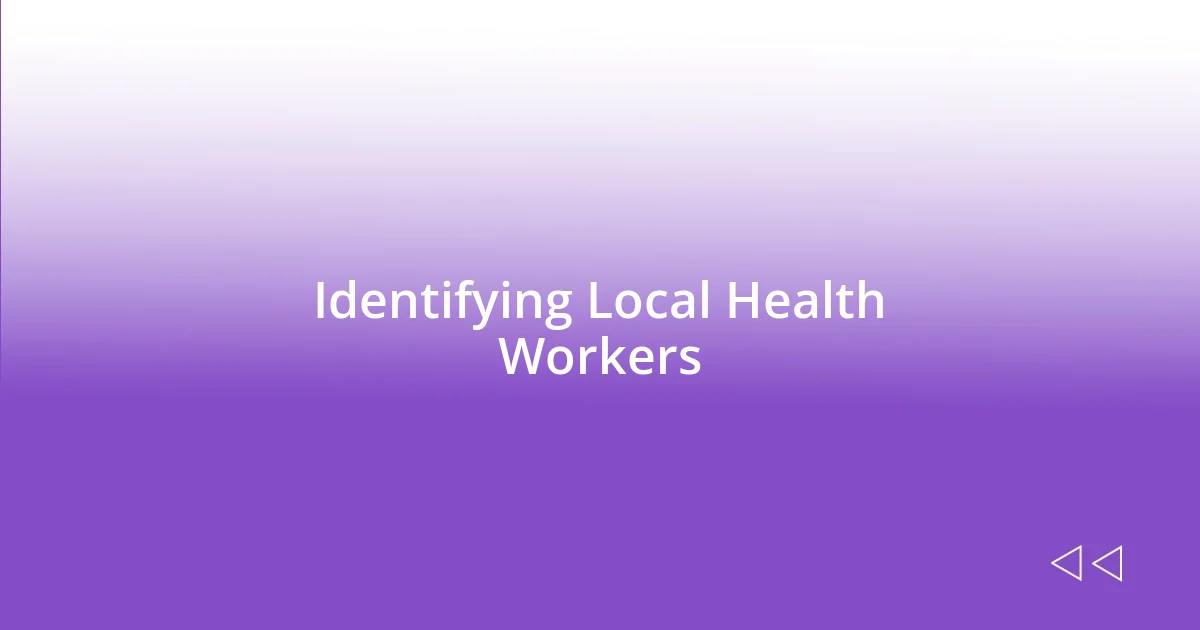
Identifying Local Health Workers
Identifying local health workers begins with looking around your community. I remember the day I visited a neighborhood health fair—it was buzzing with activity. There were nurses, community health aides, and even wellness coaches, all eager to share their expertise. Their smiles drew me in, highlighting how approachable and integral these professionals are in our lives. Don’t you think it’s fascinating how a simple event can connect you to a network of care?
Word of mouth is another powerful tool for identifying these essential workers. I once overheard a conversation at my local coffee shop about a fantastic nurse who specializes in maternal health. Curiosity piqued, I approached the table and struck up a discussion. That little interaction led me to not only find a great resource but also deepen my understanding of the struggles mothers face. Isn’t it wonderful how a casual chat can reveal hidden gems in your community?
Utilizing social media platforms can also play a pivotal role in this discovery process. I’ve found local health groups on Facebook where workers share their experiences and expertise. It’s like having a virtual open house! Plus, when I posted a simple question about local mental health services, I was met with an outpouring of recommendations. How often do we underestimate the power of our online connections to enhance our access to care in our own backyards?
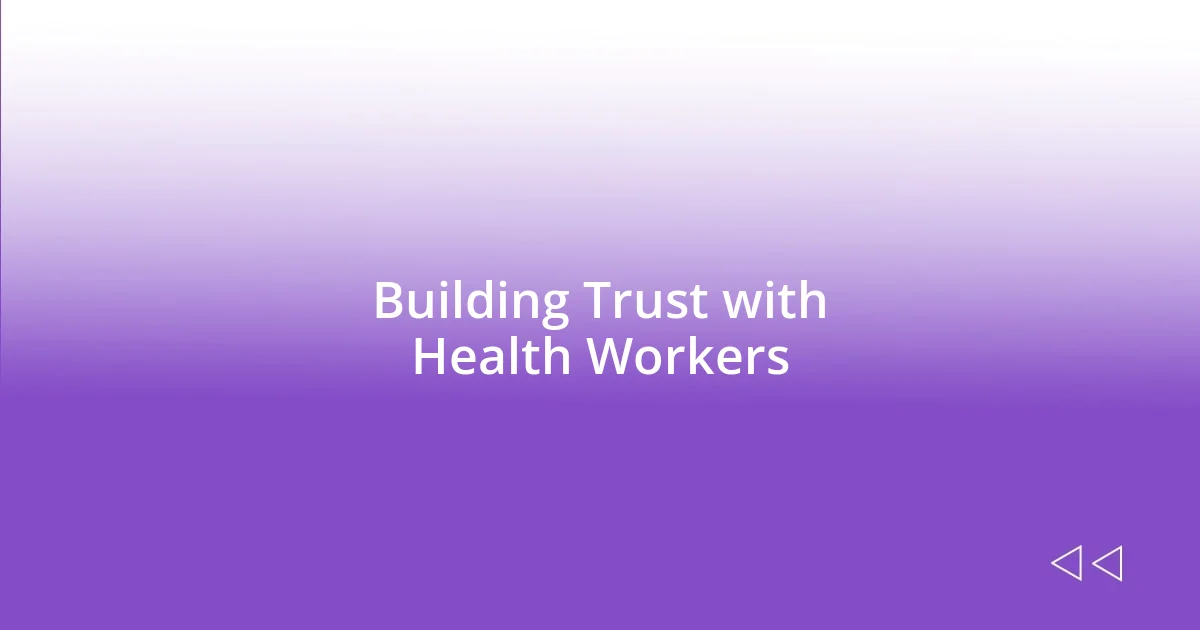
Building Trust with Health Workers
Building trust with health workers is vital for creating an effective partnership in managing health. From my experience, sharing personal stories can break down barriers. During one of my visits to a local clinic, I opened up about my past experiences with anxiety. To my surprise, the health worker responded with empathy and shared their own journey. This exchange not only strengthened our connection but also made me more comfortable discussing my mental health openly.
Another significant aspect of trust is consistency in communication. I’ve learned that regular check-ins, whether through phone calls or texts, can reinforce my relationship with local health workers. I remember setting up monthly follow-ups with a nutritionist I had encountered at the health fair. Each meeting built upon the last; we discussed progress, challenges, and goals. Can you see how ongoing interaction fosters a sense of reliability and commitment?
Lastly, transparency plays a crucial role in trust-building. I always appreciate when health workers give clear explanations about procedures and treatments. There was a time when I hesitated before a vaccination appointment. After a candid conversation about the benefits and potential side effects, I felt significantly more at ease. When health workers are straightforward and open, it paves the way for trust, ensuring patients feel valued and informed.
| Aspect | Example |
|---|---|
| Sharing Personal Stories | Discussing my anxiety with a health worker led to greater understanding. |
| Consistency in Communication | Regular follow-ups with my nutritionist improved our relationship. |
| Transparency | Candid conversations about vaccinations made me feel secure. |
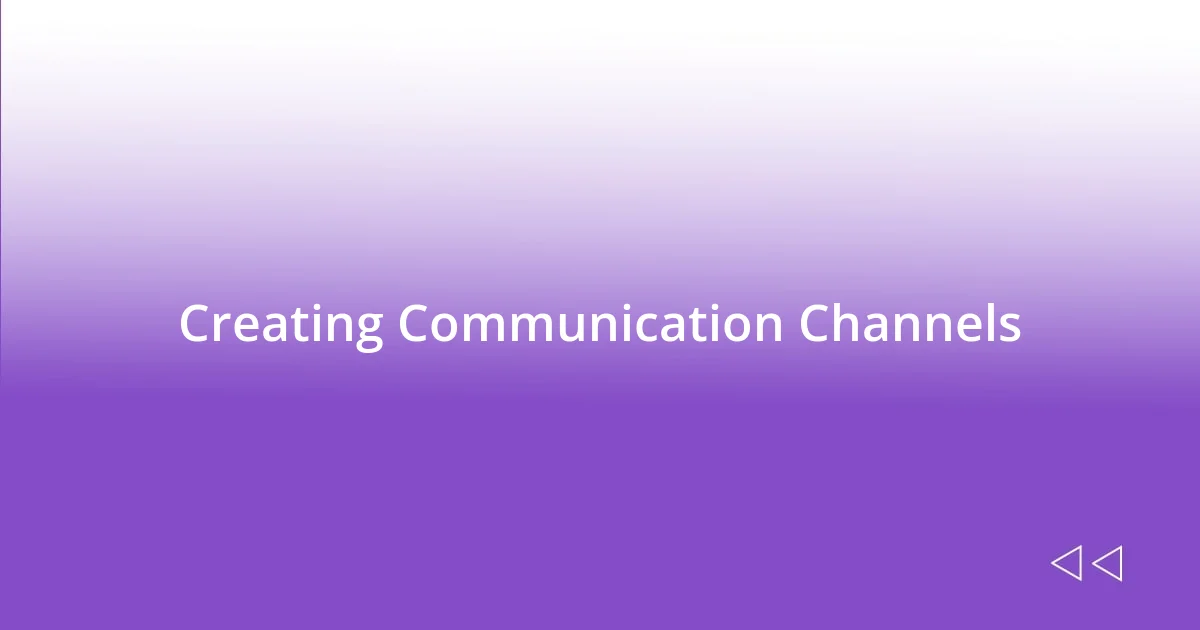
Creating Communication Channels
Creating effective communication channels is essential in connecting with local health workers. I vividly recall my first experience attending a community health workshop. It wasn’t just the presentations that captivated me; it was the small group discussions that really brought people together. During these sessions, participants exchanged valuable insights and tips on accessing local resources. Engaging in such an interactive setting helped me form immediate connections with health workers and fellow attendees alike.
To build these communication channels effectively, consider these approaches:
- Attend Local Events: Participating in health fairs, workshops, or seminars can create organic opportunities for engagement.
- Join Community Forums: Local online platforms, such as Nextdoor or Facebook groups, can facilitate discussions where health workers share their expertise.
- Use Messaging Apps: Creating a group chat with local health workers can keep lines of communication open and foster a sense of community.
- Schedule Regular Meetings: Setting up monthly check-ins allows for ongoing dialogue and relationship building.
Through these avenues, I’ve not only acquired vital information but have also deepened my ties with the health professionals in my area. The more I engaged, the more supported I felt in my health journey.
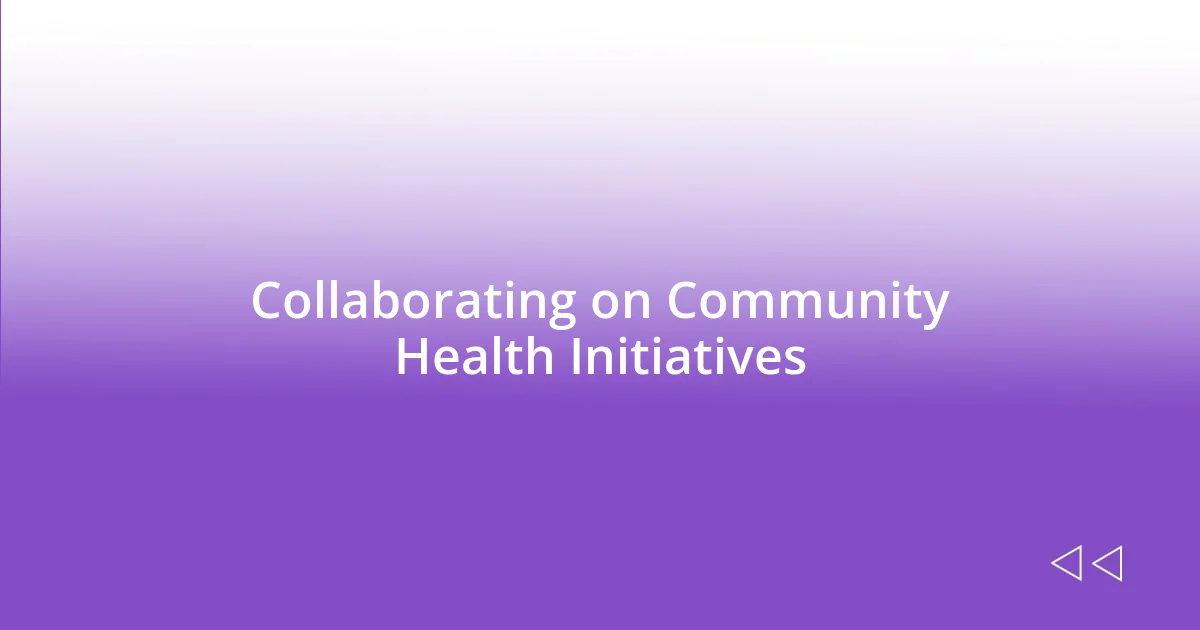
Collaborating on Community Health Initiatives
Collaborating on community health initiatives has truly transformed my perspective on local health efforts. I remember one particular day at a community garden event, where health workers shared nutrition tips while we planted vegetables together. Getting my hands dirty while learning about healthy eating created a genuine bond between us—who would have thought planting carrots could lead to conversations about diabetes prevention?
Working alongside health workers during health campaigns has also opened my eyes to the power of collaboration. I participated in a vaccination drive where we worked in shifts. During breaks, I learned about the disparities some neighborhoods face regarding health access. Hearing those real-life stories from dedicated professionals inspired me to advocate for better resources in my community. Have you ever experienced such a profound moment of connection that it motivates you to take action?
Another enriching experience occurred when I co-hosted a workshop focused on mental wellness with a local nurse. As we shared our ideas, it struck me how these initiatives foster not just knowledge, but a sense of belonging. We teamed up to create interactive sessions where attendees could discuss their mental health openly. By the end, the community felt more united and informed. Isn’t it empowering to see how collaboration can create a supportive environment where everyone thrives?
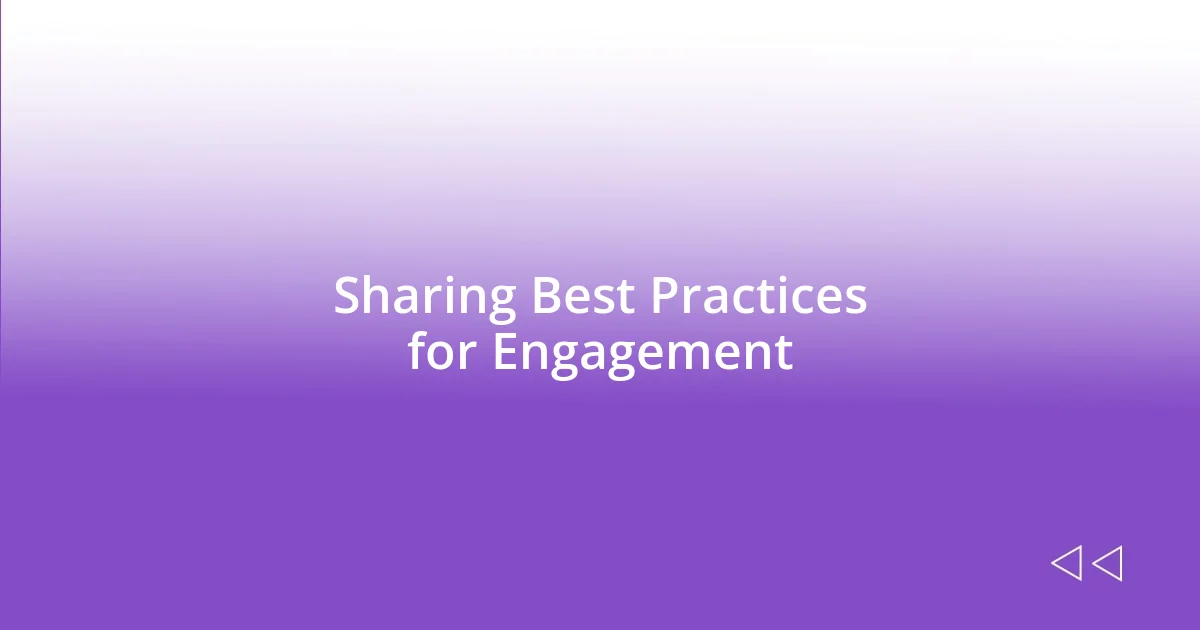
Sharing Best Practices for Engagement
Sharing best practices for engagement can turn a simple meeting into a thriving community of health advocates. I remember attending a panel discussion where health workers not only shared their experiences but also encouraged questions from the audience. This openness cultivated an atmosphere of trust and excitement. It led me to think: what if more events included this level of interaction? I feel that fostering spaces where everyone is encouraged to participate can create lasting connections that benefit community health efforts.
Moreover, I’ve found that storytelling emerges as a powerful tool in these engagements. During a recent health presentation, a nurse shared her journey in overcoming barriers in her community. Listening to her stories made me realize that it’s not just about facts and figures but the emotional resonance behind every health statistic. Stories humanize the challenges we face, don’t you think? They inspire others to share their own narratives, creating an empathetic network of support and ideas.
To deepen engagement further, I’ve seen remarkable outcomes from integrating technology. I joined a local health worker’s virtual workshop on social media’s role in public health. The interactive polls and breakout sessions pushed me to think creatively about how we can reach more people. It shook my perception of boundaries—what if health workers could reach out beyond geographical limits? Combining technology with personal interaction seems like a win-win to me!
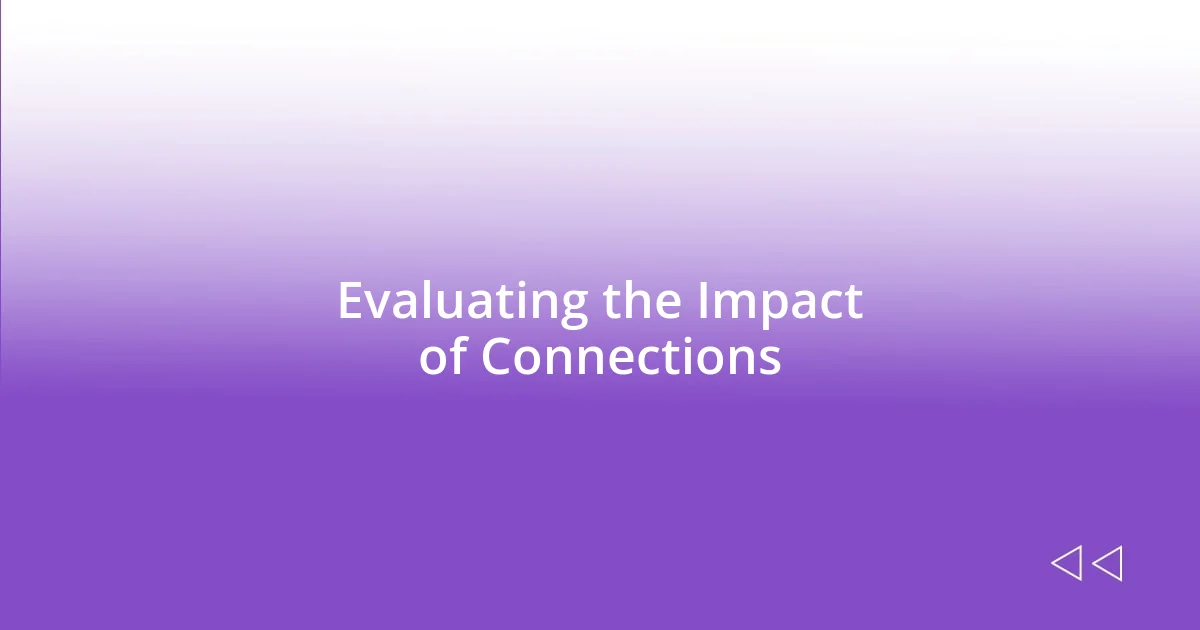
Evaluating the Impact of Connections
Evaluating the impact of connections with local health workers is truly eye-opening. I’ve often felt that when you connect with someone who shares your passion for health, the effects resonate far beyond that initial conversation. For instance, after a lively discussion with a health worker at a community event, I found myself motivated to organize a neighborhood health fair. Does that spark of inspiration often lead to new community projects for you as well?
Reflecting on my experiences, I noticed how these connections also help me gain perspective on health issues. During a workshop on chronic disease management, I listened to a health worker share their experiences working in underserved areas and the barriers patients faced. That moment really hit home for me. It made me realize how crucial accessibility is and left me contemplating my role in addressing these disparities. Have you ever felt that personal stories from health workers truly shape your understanding of community health?
Ultimately, I’ve seen firsthand that fostering strong connections leads to measurable changes in health outcomes. After collaborating on a neighborhood clean-up with local health advocates, we not only beautified the area but also raised awareness about environmental health impacts. That event drew more people than expected, sparking ongoing conversations about how our surroundings affect our wellbeing. Isn’t it incredible how engaging with passionate people can lead to tangible improvements in our communities?


